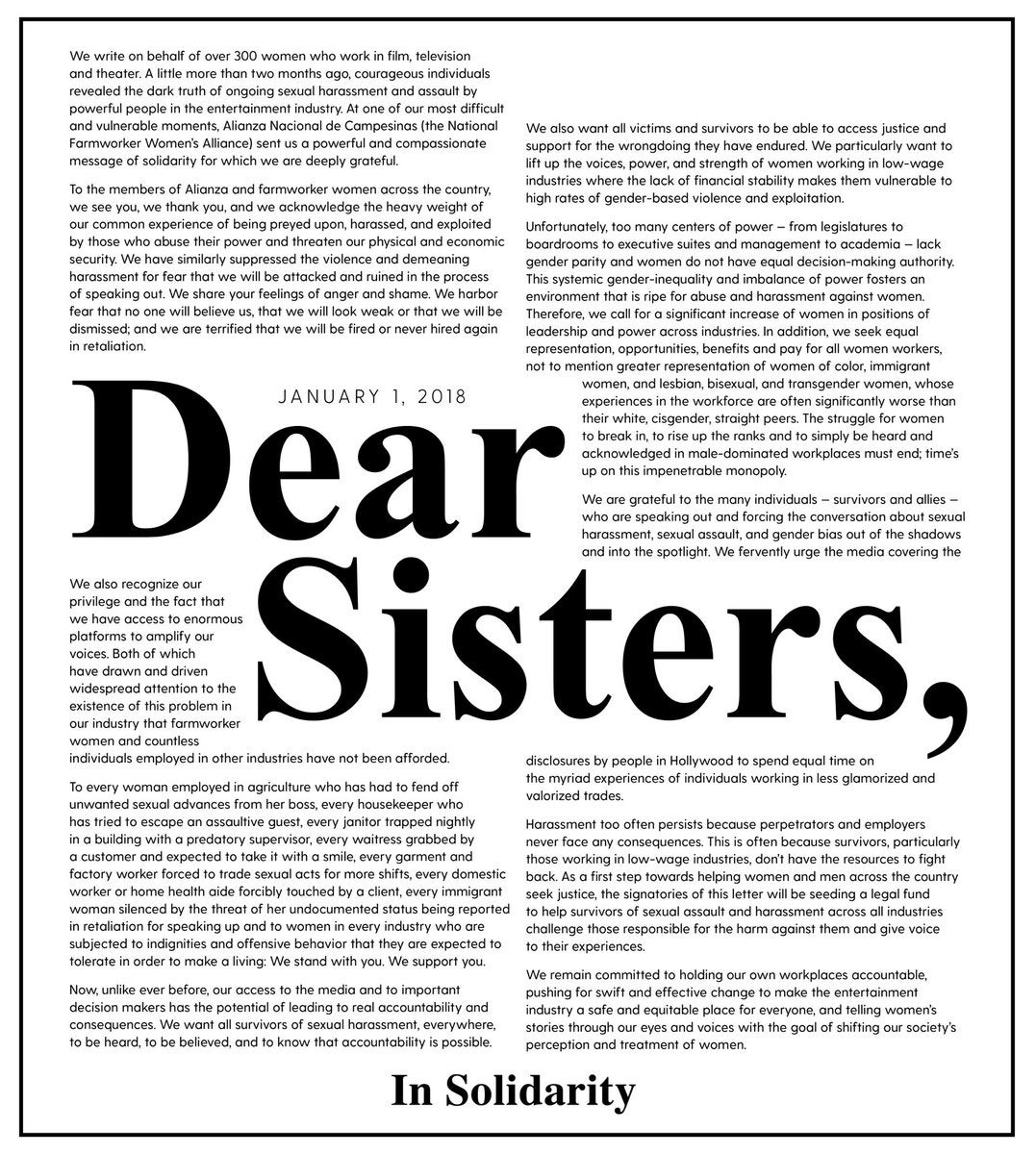Hollywood women are finally coming out for their blue-collar sisters
This week, 300 women in Hollywood—from stars like Meryl Streep to Cate Blanchett to directors such as Ava DuVernay—signed an open letter that was published in the New York Times and Los Angeles Times. In it, they shed light upon the millions of overlooked women who are at the heart of the #MeToo struggle. Their goal: a message of solidarity across socioeconomic backgrounds and gender identities.


This week, 300 women in Hollywood—from stars like Meryl Streep to Cate Blanchett to directors such as Ava DuVernay—signed an open letter that was published in the New York Times and Los Angeles Times. In it, they shed light upon the millions of overlooked women who are at the heart of the #MeToo struggle. Their goal: a message of solidarity across socioeconomic backgrounds and gender identities.
“We…recognize our privilege and the fact that we have access to enormous platforms to amplify our voices,” the letter said. “Both of which have drawn and driven widespread attention to the existence of this problem in our industry that farmworker women and countless individuals employed in other industries have not been afforded.”

But the letter was more than mere talk—it also announced the launch of the Time’s Up Now initiative, chaired by Anita Hill, which includes a $13 million legal defense fund to provide subsidized legal support for women and men beyond the headlines who’ve experienced sexual harassment, assault, or abuse in the workplace.
“We’re a bunch of women used to getting stuff done. And we’re getting stuff done,” Shonda Rhimes told the New York Times.
The move was a long time coming. Indeed, when A-list actresses like Jennifer Lawrence, Patricia Arquette and Susan Sarandon spoke out about the wage gap between them and their male counterparts in 2015, they probably didn’t expect to receive a fair amount of criticism from other women. “It’s time for all the women in America, and all the men that love women and all the gay people and all the people of color that we’ve all fought for to fight for us now,” Arquette said after winning the Academy Award for Best Supporting Actress that year.
Although her intentions might have been noble, the response to Arquette’s statement was far from supportive. Bad Feminist author Roxane Gay called out Arquette for being tone-deaf, for suggesting that everyday people of color and gay people were less disadvantaged than a white Hollywood actress.
Writer Stassa Edwards noted in feminist blog Jezebel a few months later, “celebrities aren’t average women applying for average jobs; their wages are not being depressed and driven down like the rest of the nation’s. [W]e are settling instead for a trickle-down story, effectively telling the women most impacted by the wage gap to wait your turn; we’ll get around to you once we fix the Hollywood wage gap.”
A similar situation transpired when the #MeToo movement emerged shortly after the Harvey Weinstein and Kevin Spacey stories came out in October 2017. Then—as in 2015—working-class women also felt left behind and asked their high-paid Hollywood sisters, “What about us?”
Their ask was a broad as it was loud, demanding support from Hollywood actresses and asking them to publicly acknowledge their their privilege. In November 2017, an open letter from 700,000 female farmworkers was published in Time detailing an endemic harassment culture in working-class professions—and not just in Hollywood.
“We wish that we could say we’re shocked to learn that this is such a pervasive problem in your industry,” the letter from Alianza Nacional de Campesinas said. “Sadly, we’re not surprised because it’s a reality we know far too well. Countless farmworker women across our country suffer in silence because of the widespread sexual harassment and assault that they face at work.”
The letter ended with a bold statement of support: “In these moments of despair, and as you cope with scrutiny and criticism because you have bravely chosen to speak out against the harrowing acts that were committed against you, please know that you’re not alone. We believe and stand with you.”
Hollywood took note—and action—this time. And the benefit will hopefully impact women in every industry—and in every economic class.
“Economic equality does not start at the top and work its way down. If anything, it should work bottom up,” Edwards wrote. “Placing value first on America’s most economically disenfranchised women will subsequently make us all more valuable.” Time’s Up Now’s $13 million legal defense fund is an impactful start to Hollywood’s acknowledgments of the plight of lesser privileged men and women.